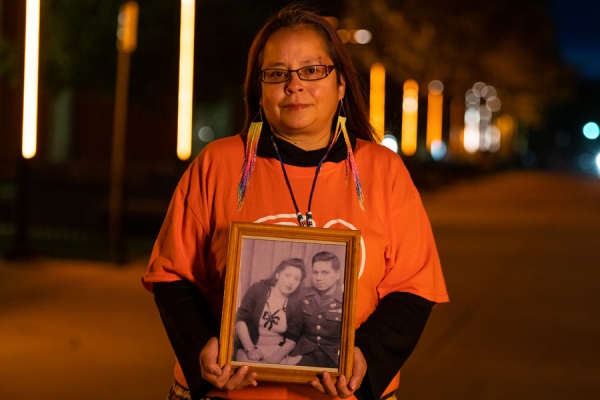 Catherine Febria with IPBES fellow Amani Al-Assaf at the organization’s 2018 plenary in Medellín, Colombia.
Catherine Febria with IPBES fellow Amani Al-Assaf at the organization’s 2018 plenary in Medellín, Colombia.
UWindsor professor Catherine Febria has been appointed to a three-year term on the multidisciplinary expert panel of the Intergovernmental science-policy Platform on Biodiversity and Ecosystem Services.
An international body with 139 member governments, the panel produces scientific assessments to support decision-making and works to build capacity to strengthen the science-policy interface, modelled on the Intergovernmental Panel on Climate Change. Its panel of experts provides scientific and technical advice and integrates Indigenous and local knowledge systems.
Tier 2 Canada Research Chair in Freshwater Restoration Ecology and assistant professor in the Department of Integrative Biology and the Great Lakes Institute for Environmental Research, Dr. Febria will travel this month to the United Nations campus in Bonn, Germany, to begin the work.
“It’s an incredible privilege to be elected to this role, a first for Canada and from the IPBES fellows,” says Febria. “It’s validating to be recognized in this way and know that my interdisciplinary training and diverse experiences in different science systems, cultures and at both local and global scales have all contributed to the kind of expertise needed.
“My hope is that I can help promote and mobilize science into policy at all scales, for the benefit of our planet’s biodiversity and future generations.”
Febria’s approach to research considers not only policy, but on-the-ground actions — explicitly considering the range of nature’s contributions to people. Partnerships, Indigenous, and local knowledge systems are at the core of her work.
This three-year appointment will involve regular global meetings and involvement in assessing technical reviews, syntheses, and other products that IPBES develops. Febria hopes to leverage this opportunity to her current research, teaching, and service contributions at UWindsor.
ZuZu Gadallah, Canada’s national focal point for IPBES at Environment and Climate Change Canada, supported Febria’s nomination.
“She is the kind of researcher that should be on the MEP,” says Dr. Gadallah. “Her research does exactly what IPBES strives to do in its assessments: to combine findings from different knowledge systems and different academic disciplines into a coherent, policy-relevant analysis.”
Chris Houser, UWindsor interim vice-president of research and innovation, says Febria is deserving of this honour.
“The need for transnational environmental research in the Great Lakes region and beyond is increasing, and Dr. Febria’s expertise in freshwater restoration has perhaps never been more critical,” says Dr. Houser.
“Her research is a great example of how University of Windsor researchers are making a difference in the quality of life for others.”








